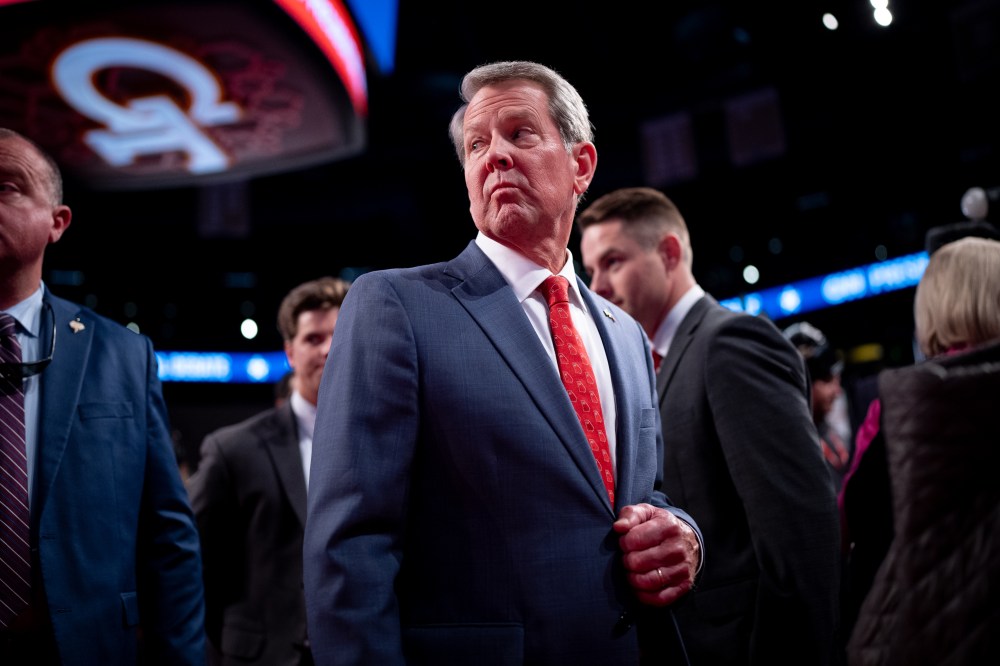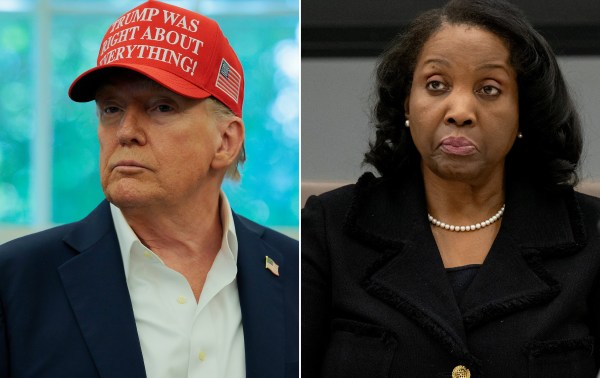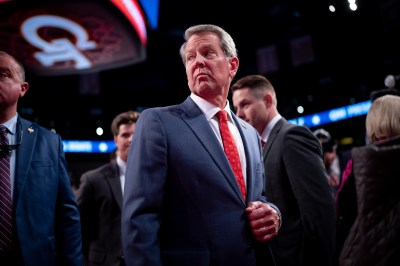The problem with running for Senate as a conservative in 2026 isn’t that you might lose, it’s that you might win.
I assume that’s what caused former New Hampshire Gov. Chris Sununu to pass on the race for a soon-to-be vacant seat in his home state last month. Losing would have been embarrassing, spoiling his record of statewide victories as governor and damaging his chances of running for president someday. But winning?
Winning would have landed him in a conference of cowards and quislings, in a branch of government that functionally no longer exists, where he’d be forever compelled to say whether he’s with or against whatever authoritarian nostalgia trip the president happens to be on that day. It’s the worst job in Washington. Even some who already hold it seem no longer to want it. Why would Sununu?
Why would Brian Kemp?
On Monday the governor of Georgia announced that he won’t stand for Senate next year either. He was the most formidable candidate Republicans could have mustered, leading Democratic incumbent Jon Ossoff by 3 points in a poll conducted last month by the Atlanta Journal-Constitution. The same survey showed Kemp rocking a 60 percent approval rating. That’s the stuff of which dream recruits are made.
No thanks, he said yesterday, dismissing a Senate candidacy as “not the right decision for me and my family.” Which sounds like standard politician boilerplate until you remember what the Kemp household went through the last time he landed in the spotlight while Donald Trump was president.
Kemp’s decision was even easier than Sununu’s was, I’d bet. Partly it has to do with his tortured history with Trump. Partly it has to do with the economic outlook, and thus the GOP’s midterm chances, having darkened further over the past month. And partly it has to do with the president’s preternatural knack for wrecking his own party’s chances at winning Senate seats in Georgia, first with the “rigged election” idiocy in early 2021 and then by rallying behind Herschel Walker’s absurd candidacy a year later.
But I suspect it has mostly to do with Kemp wanting to run for president someday. What’s a better look for a 2028 hopeful? Leaving politics next year as the popular twice-elected governor of a key swing state and keeping one’s hands clean of whatever frightening new messes Trump makes in Washington? Or wandering the halls of the Capitol, feebly trying to rationalize for reporters why this hugely embarrassing Trump nominee is worth confirming but that hugely embarrassing Trump nominee is not?
Brian Kemp is doing what he can to maximize his presidential viability in 2028 by passing on a Senate run, avoiding a job in which his votes would inevitably oscillate between pissing off Trump and right-wing populists on the one hand and pissing off everyone else in the country on the other. I think he believes there’ll be an opening for him in the next Republican presidential field.
Is he right? Could there be a “Nixon option” in the next cycle?
Mystique.
What distinguishes Kemp from Sununu and everyone else in the GOP is that he’s managed to maintain a degree of mystique in a party where only the president is supposed to be capable of such things.
The same was once true of Florida Gov. Ron DeSantis, but his moment has passed. DeSantis became the only Republican of the Trump era to build a meaningful independent base of support among populists by piling up culture-war wins in Florida and routing his Democratic opponent when he ran for reelection. He was “DeFuture” of the right—until he took on Trump in last year’s presidential primary, discovered that GOP voters care far less about policy than performative lib-owning, and quit the race after Iowa. His mystique has since dimmed sufficiently that Republican lawmakers in Florida are driving an investigation into alleged misuse of funds by his wife’s charity.
No one in the party has managed to go toe-to-toe with the president and win. Except, that is, for Brian Kemp.
Kemp didn’t run against Trump directly the way DeSantis did, but he came close, facing a former Republican senator in his 2022 gubernatorial primary whom the president backed full-throatedly. Trump treated the race as a referendum on Kemp’s refusal to help him overturn Joe Biden’s victory in Georgia in 2020; his candidate, David Perdue, litigated the issue aggressively at a debate with the governor. A “disloyal” conservative incumbent versus a conspiratorial Trump toady normally means annihilation in a Republican campaign.
And someone did get annihilated in this case. Perdue, and Trump, got annihilated by Kemp.
No other Republican politician since 2015 has faced such intense wrath from the president and waltzed to victory anyway, which gives Kemp a certain mystique. Even more impressive is the fact that he won despite declining to participate in Trump’s “rigged election” nonsense, an unforgivable offense in the eyes of many Republican voters. The last 10 years of right-wing politics can be summarized in one sentence: You can have a career or you can have your dignity, but you can’t have both. Somehow Kemp has both.
He’s an independent-minded conservative in a party run by and for demagogues and somehow he’s a great success. He’s the last interesting Republican.
He’s also had the good fortune to draw one of the grassroots right’s least favorite progressives, Stacey Abrams, as his opponent in his two runs for governor. Beating Abrams twice gave Kemp impeccable credentials for “having the right enemies,” as did his insistence on reopening some businesses in Georgia early in the COVID pandemic over the left’s (and Donald Trump’s) objections. He also took the lead in defending his state’s new voting law in 2021 when Democrats, led by Biden, were demagoging it as a new Jim Crow regime. He fights—and he wins. Even when the president is his opponent.
That’s the essence of mystique for a Republican politician and it’s why Kemp opted not to bother with a Senate run. Either he would have lost a squeaker to Ossoff as the Trump economy deteriorated, spoiling his reputation as a winner, or he would have ended up in a powerless job that would have required him to roll over frequently for the president. So much for “fighting” and winning, or for dignity.
By not running, he’s preserving his mystique. Which sets him up to be the “Nixon option” in the next presidential field.
Kemp and Nixon.
Brian Kemp and Richard Nixon aren’t perfect analogues, to put it mildly, and not just because the former is reliably more conservative on policy than the latter ever was.
Having served two terms as vice president and been his party’s presidential nominee in 1960, Nixon was much better known to Republican voters nationally in 1968 than Kemp would be in 2028. He didn’t have Kemp’s spotless electoral record either: He lost the 1960 election, famously (and barely), then lost the California gubernatorial race in 1962.
But Nixon was well positioned to reemerge as the face of old-school centrist Republicanism after staunch conservative Barry Goldwater was obliterated at the polls in 1964. Seeking a new direction four years later, the GOP turned to a figure who represented a more successful version of the party. That’s the same niche Kemp would seek to fill in 2028. All he needs is for Trumpism to be obliterated in some way and there he’ll be, the most successful Reaganite former governor in the country, ready to pick up the pieces.
Nikki Haley hoped to fill that niche in last year’s primary. She gambled that Trump’s many civic disgraces—January 6, criminal charges, “mean tweets” of deepening insanity—would repulse swing voters so profoundly as to make the former president unelectable. Once general election polls began predicting a Goldwater-esque rout of the GOP with Trump atop the ballot, Haley calculated, GOP primary voters would revert to a more electable tried-and-true Republican of yesteryear like they did in 1968.
Alas, it turns out Americans don’t care about civics. (Neither does Nikki Haley.) Trumpism will not be obliterated at the polls on the grounds that it’s too authoritarian.
But what if voters come to realize that its economic policies are moronic, destructive, and more than a little Maoist in spirit? Could that lead to a political obliteration?
That’s Kemp’s opening in 2028. He’ll be standing by to fill the Nixon/Haley niche as an old-school Republican with a bit of mystique whose nomination can rebrand the party if and when Trump drives the economy off a cliff and obliterates public support for him and the GOP in the process.
In a primary like that, where Trumpist Republicanism is well and truly shot and disaster looms in November, the usual benefits of being a presidential flunky would become liabilities. Good luck convincing swing voters to rally behind Vice President J.D. Vance or Secretary of State Marco Rubio in a general election when both will bear the political fingerprints of a deeply unpopular president. Only someone who’s separated himself politically from Trump will stand a puncher’s chance against the Democrats.
That’s Kemp—conservative enough for traditional Republicans, a skilled enough “fighter” for populists, and Trump-skeptical enough for swing voters who won’t tolerate another four-year experiment with tariffs. Even MAGA diehards might come around to nominating a Reaganite in 2028 if it looks like the party is doomed to lose due to economic troubles. Better that the sacrificial lamb be a figure who represents the GOP’s pre-Trump era than its current one.
Kemp could get even a boost from the results of the 2026 midterms. Rep. Marjorie Taylor Greene is mulling her own challenge to Ossoff in Georgia; the recent Journal-Constitution poll that had Kemp leading the incumbent there by 3 has her trailing by, er, 17. And that isn’t the only case where GOP voters might plausibly fumble away what should be a winnable election. Ken Paxton, Texas’ scandalous attorney general, stands a good chance of beating Sen. John Cornyn in a primary and a nonzero chance of losing to a Democrat in the general.
If Republican voters come away from next year’s election believing that loud-and-proud MAGA candidates are damaged goods, especially when Trump isn’t on the ballot, they’ll look hard at Kemp in 2028. In theory.
But in practice?
A longshot.
Let’s start in reverse. Why would Republican voters learn hard lessons about the viability of populist candidates in 2026 when they didn’t do so in 2022?
Herschel Walker, Doug Mastriano, Kari Lake, Blake Masters, Mehmet Oz: Each ended up as the GOP nominee in an important swing-state race in the last midterm and each kook-ed his or her way to defeat. Those results were supposed to give sane populist Ron DeSantis an edge on Trump in the coming presidential primary. Instead Trump rolled over him, picked up a few felony criminal convictions en route to the general election, and still became the first Republican in 20 years not only to be reelected but to win the popular vote.
There’s no reason to think GOP voters will care any more about “electability” in the next presidential race than they did last year. No one can confidently say anymore what sort of character Americans will and won’t elect, frankly, especially in a presidential race where low-propensity voters are out in force. And even if “electability” matters in 2028, potential candidates like J.D. Vance and Marco Rubio aren’t kooks in the Marjorie Taylor Greene mold. Whatever Kemp’s normie advantage won’t be as great as we might think.
Another problem: Discrediting Trumpism in the eyes of GOP voters will be much trickier than discrediting Goldwater conservatism was after the repudiation of the 1964 election. Trump has two national wins to his credit, nearly won the 2020 election as well, and has made the sort of inroads with nonwhite working-class voters that the party dreamed for 50 years of making. Goldwater’s nomination was a break with traditional Republicanism and could be dismissed afterward as a failed experiment. That’s probably how Trumpism would have been spun had Trump lost in 2016.
But now? It would take a severe economic crisis, I think, to discredit MAGAnomics so thoroughly that party voters would feel moved to abandon an ideology that’s delivered multiple presidential victories and total control of Congress. Parties have lost the presidency many times because of backlash to economic conditions (including last year) but not since 1980—or 1932—have conditions been so bad as to cause a paradigm shift in how American voters view the government’s role in managing the economy.
Nothing short of a Hooveresque calamity may be capable of disillusioning Republican primary voters about the protectionist policies of a leader whom they idolize. Remember, 2028 won’t be an open primary like 1968 was; to some significant degree it’s destined to be an “heir apparent” contest with Trump’s legacy at stake, the sitting VP on the ballot, and the president himself meddling from the sidelines. Republican voters will want to give Trump and Trumpism every benefit of the doubt on their records and then some. Unless a recession strikes that’s so dire as to be unspinnable, scapegoats will be found for their failures instead.
“Globalists,” greedy corporations, foreign saboteurs—those are the villains of the 2028 Republican primary, not Donald Trump. True Trumpism has never been tried.
Brian Kemp will be expected to go along with that to some greater or lesser degree. Right-wing voters will resent any candidate who suggests, even obliquely, that they themselves are to blame for the hardships America is facing because they insisted on elevating a nationalist doofus to the presidency and then defending him no matter how stupidly and corruptly he behaved. You can’t win a GOP presidential primary unless you attack Trump—yet for many voters attacking Trump all but disqualifies you from leading the GOP, as DeSantis and Haley discovered.
Defending Trump’s economic policy won’t be the only litmus test Kemp is forced to pass, either. Lord only knows what sort of sordid crises the president will have foisted on America by the time 2028 rolls around, but Republican hopefuls will be expected to defend—or at least minimize—all of them. Good luck to Kemp in trying to maintain his dignity and mystique while walking a tightrope on whether we should be bombing Greenland or arresting Supreme Court justices.
And of course there’s a decent chance that the next GOP primary will include Trump himself, whether because he’s chosen to run for an illegal third term or because he’s conniving, right out in the open, to remain in office past January 20, 2029 unlawfully. No matter what Kemp ends up saying about that, he’ll come out a loser: Condemning it forcefully would offend populists, relegating him to “them” status in a movement that divides the world into “us and them,” while not condemning it forcefully would alienate normies who’d view him as just another spineless conservative afraid to say what’s right.
He’d end up in the Haley zone, political no-man’s land, another casualty of the Republican hostage crisis.
Even if the political stars aligned for Kemp, delivering an economic catastrophe that discredited Trumpism and thrust him into real contention in 2028, what would his reward be? Americans wouldn’t want to be governed for four more years by the same party that inflicted so much pain, whether or not it’s governed by a Republican smarter and more respectable than Trump. Democrats would almost certainly win in November going away. Kemp would end up playing John McCain to some left-winger’s Barack Obama.
Sen. Kemp?
I don’t think he’ll get that far, though.
I repeat what I said about Chris Sununu: A Reaganite will not lead a party that’s undergone a personality transplant leaving it considerably dumber, crueler, and more paranoid than it used to be. The GOP is no country for old conservatives. I think Kemp will end up doing what Sununu will likely end up doing, not bothering with the presidential race at all and instead challenging the other incumbent Democratic senator in his home state who’s up for reelection that year. Republicans should fare better down ballot during a presidential cycle like 2028 than they will next fall and being a senator in a post-Trump Washington won’t be quite as relentlessly terrible a job as it is now.
Sen. Kemp is a live possibility in 2029.
Poor guy, though. Diehard Trumpers hated him for not abetting the 2020 coup plot, then hated him for running against Trump’s gubernatorial candidate in 2022, and now hate him for not running for office in Georgia because he may be the only Republican there capable of beating Ossoff. Come 2028, if he dives into the presidential race, they’ll go back to hating him for being a conservative anachronism in an authoritarian party. Hopefully he’ll find something better to do with his life before then than be the Mike Pence of the next cycle.







Please note that we at The Dispatch hold ourselves, our work, and our commenters to a higher standard than other places on the internet. We welcome comments that foster genuine debate or discussion—including comments critical of us or our work—but responses that include ad hominem attacks on fellow Dispatch members or are intended to stoke fear and anger may be moderated.
With your membership, you only have the ability to comment on The Morning Dispatch articles. Consider upgrading to join the conversation everywhere.